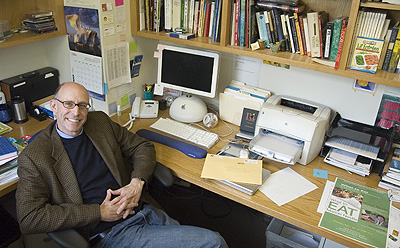Thought For Food

I'm always behind on everything. I started Atkins after the world decided it was unhealthy and ineffective. I am also a bit over-weight even though I try to eat healthy and in moderation. Now I think I know why.
While we were driving back to Minnesota I heard a very interesting interview on the radio with Berkeley Professor Michael Pollan, who has written a new book called In Defense of Food. He also wrote the Omnivore's Dilemma. Unfortunately we had to stop to fuel up somewhere in the midst of the program, but after googling around a bit I found this old article from the New York Times (from a whole year ago)
Here are a few very interesting snippets from Pollan's article titled "Unhappy Meals"
"From Complexity to Simplicity. If there is one word that covers nearly all the changes industrialization has made to the food chain, it would be simplification. Chemical fertilizers simplify the chemistry of the soil, which in turn appears to simplify the chemistry of the food grown in that soil. Since the widespread adoption of synthetic nitrogen fertilizers in the 1950s, the nutritional quality of produce in America has, according to U.S.D.A. figures, declined significantly. Some researchers blame the quality of the soil for the decline; others cite the tendency of modern plant breeding to select for industrial qualities like yield rather than nutritional quality. Whichever it is, the trend toward simplification of our food continues on up the chain. Processing foods depletes them of many nutrients..."
"Put in the simplest terms, we’re eating a lot more seeds and a lot fewer leaves, a tectonic dietary shift the full implications of which we are just beginning to glimpse. If I may borrow the nutritionist’s reductionist vocabulary for a moment, there are a host of critical micronutrients that are harder to get from a diet of refined seeds than from a diet of leaves. There are the antioxidants and all the other newly discovered phytochemicals (remember that sprig of thyme?); there is the fiber, and then there are the healthy omega-3 fats found in leafy green plants, which may turn out to be most important benefit of all."
"As we’ve shifted from leaves to seeds, the ratio of omega-6s to omega-3s in our bodies has shifted, too. At the same time, modern food-production practices have further diminished the omega-3s in our diet. Omega-3s, being less stable than omega-6s, spoil more readily, so we have selected for plants that produce fewer of them; further, when we partly hydrogenate oils to render them more stable, omega-3s are eliminated. Industrial meat, raised on seeds rather than leaves, has fewer omega-3s and more omega-6s than preindustrial meat used to have. And official dietary advice since the 1970s has promoted the consumption of polyunsaturated vegetable oils, most of which are high in omega-6s (corn and soy, especially). Thus, without realizing what we were doing, we significantly altered the ratio of these two essential fats in our diets and bodies, with the result that the ratio of omega-6 to omega-3 in the typical American today stands at more than 10 to 1; before the widespread introduction of seed oils at the turn of the last century, it was closer to 1 to 1."
"The role of these lipids is not completely understood, but many researchers say that these historically low levels of omega-3 (or, conversely, high levels of omega-6) bear responsibility for many of the chronic diseases associated with the Western diet, especially heart disease and diabetes. (Some researchers implicate omega-3 deficiency in rising rates of depression and learning disabilities as well.) To remedy this deficiency, nutritionism classically argues for taking omega-3 supplements or fortifying food products, but because of the complex, competitive relationship between omega-3 and omega-6, adding more omega-3s to the diet may not do much good unless you also reduce your intake of omega-6."
He makes 9 suggestions for better eating, one of which is eat like your great, great grandmother. Thank goodness they made cookies back then! I guess I had better aim for oatmeal raisin!
Jan 28 2007 New York Times article by Michael Pollan


4 comments:
My great grandmother ate apple strudel. I'm good.
The problem is that Great Grandma spent all day in the kitchen (when she wasn't doing the wash). I'd starve to death before I got one meal prepared.
Wow, that actually made a lot of sense and here I thought it was because of all the Twinkies I was eating......wait, er, it's still because of all the Twinkies I'm eating.
I've been hearing this around, too.
makes me want to expand my teeny garden spot in the back yard.
Post a Comment